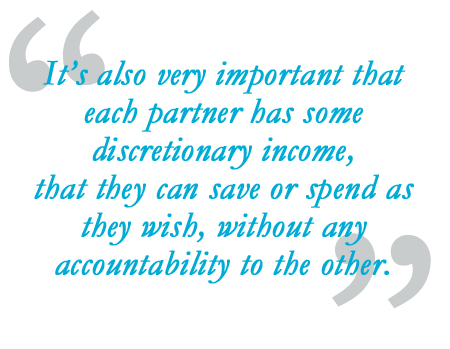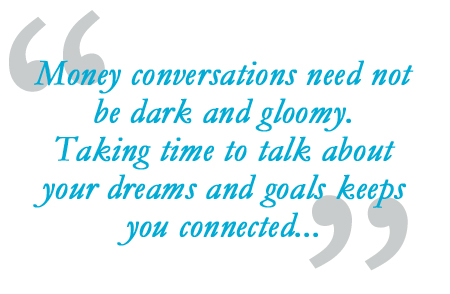By Melanie Buffel, B.A. Psych, MBA Candidate
 Marriages suffer when there is financial stress. Sometimes they fail. In Canada, where the divorce rate is 48%, money issues are often cited as a contributing factor in a relationship’s downfall. But there is so much that you can do to start your wedded life on solid financial footing, and it all revolves around honest communication.
Marriages suffer when there is financial stress. Sometimes they fail. In Canada, where the divorce rate is 48%, money issues are often cited as a contributing factor in a relationship’s downfall. But there is so much that you can do to start your wedded life on solid financial footing, and it all revolves around honest communication.
The vow, for richer or for poorer, shouldn’t be the first financial discussion you have with your partner before saying I do.
With wedding expenses in the thousands of dollars, it’s not surprising that money issues start causing tension even before the big day. But a couple may naively assume that it’s all part of the wedding planning stress and that things will settle down once they fly off on their honeymoon.
The truth is, the first three years of marriage are fraught with the expenses of setting up a home, and establishing a career, coupled with blending spending and saving habits that may be very different. Even couples that lived together in financial harmony before marriage, can be surprised by financial differences now that they are planning a future. Many people assume that once they are married they will have the same priorities; when in fact one partner may want to enjoy more travel and social events before they “settle down,” and the other may want to trim expenses and save for a home.
With Valentine’s Day just around the corner –a time when many couples get engaged– here are five ways to make money a point of foundation in your marriage:
- Start the conversation well before the wedding;
- Understand where the money goes;
- Agree who pays for what;
- Determine who will manage the money; and
- Keep on talking
Let’s have a closer look at each.
Start the conversation well before the wedding
The moment you marry your financial well-being is linked. That is not the time to discover your new spouse has debt you knew nothing about, or that his or her credit score may undermine your chances of buying a home.
 Sit down together and start with the facts; share your credit card statements, investment statements, account balances, pay stubs, tax returns, even a copy of your credit report –if you are unsure of how to obtain your credit report read this. You probably aren’t used to displaying your finances so openly, but remember; this is the person you intend to grow old with, you don’t want to start your marriage with secrets or “alternative facts.” And disclosure doesn’t automatically mean you’ll uncover issues. You may discover that you are in a stronger financial position together than you imagined. But even if this conversation does bring-up some tension or discomfort, a tough conversation now is better than resentment and arguments in the future.
Sit down together and start with the facts; share your credit card statements, investment statements, account balances, pay stubs, tax returns, even a copy of your credit report –if you are unsure of how to obtain your credit report read this. You probably aren’t used to displaying your finances so openly, but remember; this is the person you intend to grow old with, you don’t want to start your marriage with secrets or “alternative facts.” And disclosure doesn’t automatically mean you’ll uncover issues. You may discover that you are in a stronger financial position together than you imagined. But even if this conversation does bring-up some tension or discomfort, a tough conversation now is better than resentment and arguments in the future.
This is a time to be excited about your future. Share your big and small dreams with each other, then begin to set some short and long term goals.
Understand where your money goes
When we talk about money stress, it goes without saying that we’re not talking about the stress of abundance. The number one money stressor is debt. In our buy-now, pay-later culture, it’s very easy to overspend. And newlyweds, who suddenly have a bigger pot to spend from, can easily lose track of where the money is flowing, unless they take the time to track their expenses.
Tracking cash flow is a habit well worth cultivating early in your marriage. Start by making lists of all the household expenses, including the fixed expenses like rent, mortgage, car payments, and insurance. Next make a list of your joint discretionary expenses, this would include things like movies, concerts, and restaurants, but also includes joint “wants” like a new TV or couple’s gym membership. Lastly, each of you should make a list of your personal discretionary expenses; this would cover things like haircuts, clothing and other personal items.
Understanding where your money goes is the first step in making spending decisions that support your joint goals. It also helps to open-up the discussion of who will be responsible for which expenses.
Agree who pays for what
Unlike in generations past, both partners in today’s unions likely have careers. But how much each person earns may be moderately or significantly different. So while a 50/50 responsibility for expenses may seem fair on the surface, you may want to come up with a division that takes income difference into account. If everything is split 50/50, how will  you handle events or travel that perhaps are out of financial range for one partner?
you handle events or travel that perhaps are out of financial range for one partner?
If you decide to pool resources, you’ll want to discuss how much money one partner can spend without consulting with the other. For example, is it OK to go out for an unexpected meal with coworkers, even though you had an agreement to brown bag your lunches, but not OK to replace the microwave without a conversation first?
It’s also very important that each partner has some discretionary income that they can save or spend as they wish, without any accountability to the other. Having no financial autonomy breeds resentment and can lead to secret spending.
Determine who will manage the money
There are several ways to manage your money; separate accounts with each of you responsible for certain expenses; personal accounts where your pay is deposited and a joint account that you both contribute to for expenses; or one joint account where all the money is deposited. The right answer is the one that suits your way of thinking. But no  matter how you decide to set up your accounts, you must be sure you are clear on who is actually going to make the monthly payments. You don’t want to find yourselves sitting in the dark, because you each thought the other one was paying the hydro bill.
matter how you decide to set up your accounts, you must be sure you are clear on who is actually going to make the monthly payments. You don’t want to find yourselves sitting in the dark, because you each thought the other one was paying the hydro bill.
It’s not uncommon for one partner to gravitate more than the other, to the idea of managing the expenses and/or investing. This is fine, as long as the less active partner is fully aware of how the money is being handled and has joint access to all the information surrounding finances, (shared access to online banking is great for this). All decisions affect the both of you; no one should ever be in the dark about his or her finances. Illness, sudden death or divorce can leave the disconnected partner at a great disadvantage. If there are meetings with an advisor, you should both be present and have a voice.
Keep on talking
The full disclosure and open discussion you had before the wedding was just the beginning of an ongoing dialogue. It may also be the most challenging aspect of your martial money relationship. Money is a tool for building a future, but when a relationship is struggling, money can be used as a weapon. It can be used to control or belittle someone, and that is always toxic to a relationship. This is less likely to happen if you keep the money conversation open and maintain a voice in all decisions right from the beginning.
Money can also be used as a crutch. Overspending, even gambling, can become a way for one partner to deal with stress or depression. But this can only happen if spending is hidden from the other partner. If you keep a light on your finances, by both of you monitoring your accounts and having monthly money meetings, you can uncover issues, and confront problems, before they get out of hand.
 Sometimes we resist discussing money because we just aren’t interested in having someone question how we spend it. We may see ourselves as entitled to spend what we work so hard to earn, and see our partner as self-righteous and critical. Of course our partner feels like he or she is the one being disrespected, and sees us as selfish or even childish. This adversarial position comes from not really hearing the other person’s needs and blaming instead of communicating.
Sometimes we resist discussing money because we just aren’t interested in having someone question how we spend it. We may see ourselves as entitled to spend what we work so hard to earn, and see our partner as self-righteous and critical. Of course our partner feels like he or she is the one being disrespected, and sees us as selfish or even childish. This adversarial position comes from not really hearing the other person’s needs and blaming instead of communicating.
Money conversations need not be dark and gloomy. Taking time to talk about your dreams and goals keeps you connected and makes it all the more likely that you will both do what it takes to accomplish those goals. When discussing your progress, remember to have fun talking about the why behind what you are working for. Renew your energy and commitment to your future. Make money meetings something you look forward to, because they fill you with purpose and direction.
How you do anything, is how you do everything
Money Stress is routinely blamed for marriage breakdown. But if our relationship to money has such an impact on our relationship to our spouse, doesn’t it stand to reason that if we cultivate a great relationship around money, we will strengthen our marriage?
If we have respect around money we will have respect in general. If we are committed to our shared financial goals, it means we are committed to each other’s security and happiness. If we are honest and transparent around money, honesty and transparency will be something we value in all areas of our marriage. Or as popular wisdom states; how you do anything, is how you do everything.
We hope this article has been helpful and provided some practical advice on how you can improve your financial well being. If you need additional support, please contact one of our Money Coaches today.



After 50 years of marriage we have found that these five steps are very important. However
at that time we did not know of these strategies. We just seemed to slide unknowingly into them.
And the rest is history!!!
Hi Karen R